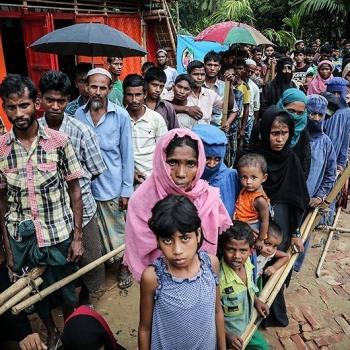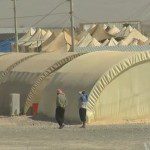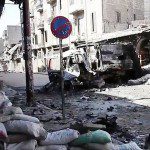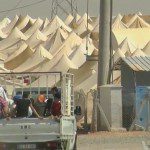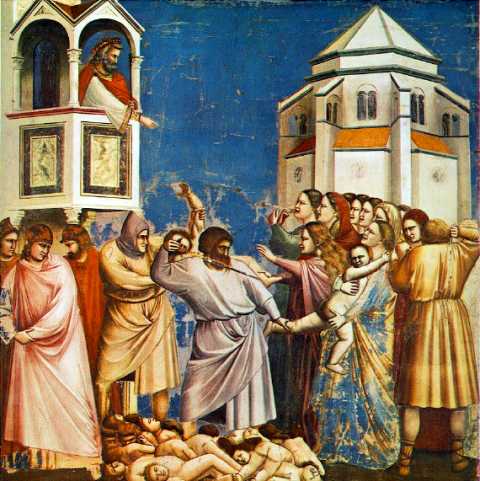
Let’s start with the fact that I am not a fan of the near-constant drumbeat that the Holy Family was, in travelling to Bethlehem, a refugee family. They were travelling within their own homeland for purposes of being formally registered in Joseph’s hometown. And however much the Mexicans might enjoy their posedas tradition in which Mary and Joseph seek shelter and are repeatedly turned away, every Christmas authors remind us that that scripture text would be more accurately, though clumsily, rendered, to give it a greater meaning in English, “they stayed in the part of the house where the animals are kept, because someone else was already staying in the guest room.”
But, of course, there is a case that could be made for applying the label “refugee” when they fled Bethlehem for Egypt to avoid being caught up in Herod’s Massacre of the Innocents. Yes, Egypt and Judea were both a part of the Roman Empire, though of different jurisdictions. Yes, no such territories required visas or Green Cards. Yes, Joseph would have been rejected if he has applied for asylum. (“I had a dream that I needed to leave Bethlehem because Herod was going to kill all the babies there.” “You’re delusional if you think we’ll admit you because you had a dream your baby was in danger.”) And, yes, when it was safe to return, they did so (though to Nazareth in Galilee rather than Bethlehem) rather than settling permanently in Egypt.
But it is still the case that they were fleeing their hometown because their child’s life was threatened.
And I don’t think anyone rejects the importance of providing safety for those whose lives are in danger. If all of Mexico were to go kablooey, we in the United States would have the obligation to offer refuge to the hapless Mexicans — and that would be true regardless of whether the Bible stories around Jesus’s birth included the Flight Into Egypt. But the Bible doesn’t provide detailed prescriptions of migration policy. Does our obligation as a country with relative wealth and at peace extend to resettling refugees in the country? Is it sufficient for Syrian refugees, say, to have their needs met in refugee camps, with the ultimate aim of return to their homes, instead? Does our obligation to allow illegal immigrants to stay, extend from those who fear persecution due to their religion or ethnicity or social class (Yazidis or Rohingya or kulaks) to those who fear violence in high-crime areas (and claim that state is incapable or unwilling to pursue the criminals) or simply want to improve their standard of living? And, whatever our obligations as individual believing Christians may be, how do they translate into the obligations of a secular nation-state which is expected to safeguard its own citizens and prioritize their own well-being?
The Bible doesn’t say.
It’s my understanding that, in Islam, questions of this sort are answered by hadith, stories of the life of Muhammed which have been handed down. Islamic scholars consider certain collections to have greater authenticity than others. As a result, any such moral issue is solved by finding the right hadith to apply. But Christians use both scripture and general principles to reason towards the right answer. And in the same way as Mormons and some Protestants will say that church members must give 10%, but Catholics don’t prescribe a precise answer on how much to give to the church/to charity, so too, especially when it comes to questions of obligations, rather than prohibitions/thou-shalt-nots, there are not always clear-cut answers.
Now, near as I can tell, there’s no traditional deeper theology about these events; the Catholic Encyclopedia doesn’t include anything profound or symbolic. Especially with respect to the Flight into Egypt, I’m not seeing anything other than apocryphal stories of God’s providence as the Holy Family crossed the desert into Egypt. What was of greater interest to the early Church Fathers was the Massacre of the Innocents, as they addressed the question of why God would have permitted this to have happened (the answer was partly that Herod was just super-evil but also that they were martyrs and their death wasn’t in vain because they attained eternal life).
So, again, the Holy Family took refuge in Egypt. You can call them “refugees” or “internally displaced people” or whatever you like. But that does not in itself provide a template for American refugee policy.
Image: https://commons.wikimedia.org/wiki/File:Giotto-innocents.jpg; Giotto di Bondone [Public domain]



